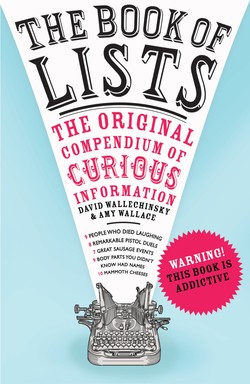Читать книгу The Book Of Lists - David Wallechinsky - Страница 34
На сайте Литреса книга снята с продажи.
Kevin Macdonald’s 10 Favourite Documentaries of All Time
ОглавлениеBorn in Glasgow in 1967, Kevin Macdonald is a documentary film-maker whose films include Channel Four’s Humphrey Jennings: The Man Who Listened To Britain (2000) and the Oscar-winning One Day in September (1999). He also wrote and directed the biography of his grandfather, Emeric Pressburger: The Life and Death of a Screenwriter (1994), and his most recent documentary is a short film, Return to Siula Grande (2004), about how climbers Joe Simpson and Simon Yates revisited their experience for Macdonald’s film Touching the Void (2003), inspired by Simpson’s book of the same name.
1 NOW (Santiago Alvarez, 1965) Using pirated stills and archive footage, set to a song by Lena Horne that had been banned in the United States, Cuba’s pre-eminent film-maker fashioned a six-minute masterpiece which angrily, yet stylishly, denounces rascism. It inspired me to think that serious subjects need not be handled in an obviously serious way.
2 THE THIN BLUE LINE (Errol Morris, 1988) A film which contains not only the solution to a real life murder mystery but also a thesis on the nature of knowledge itself.
3 VIDEO DIARY: ‘THE MAN WHO LOVES GARY LINEKER’ (1992) The evolution of cheap, high-quality home video cameras has radically altered the documentary over the last decade or so. Suddenly small, personal, domestic stories became easily filmable and the result was a rash of the freshest, most unpretentious films you are ever likely to see. This particular documentary was from the second series of BBC ‘Video Diaries’ and was made by (and about) an Albanian doctor who lives and works in the most appalling circumstances and who loves to listen to English football on the World Service. He hero-worships the Tottenham Hotspur and England player Gary Lineker. It makes you cry – and wonder why you complain so much about your life.
4 THE SORROW AND THE PITY (Marcel Ophuls, 1969) It’s five hours long, at times confusing and frustrating, but I don’t know of any other film with quite the intelligence and humanity of Ophuls’ masterwork about a small French town under Nazi occupation. All human life is here.
5 DIARY FOR TIMOTHY (Humphrey Jennings 1945) It could as easily be Listen to Britain or Fires Were Started – all of them show Jennings’ surrealist flair for the striking image that burrows deep into your subconscious. All are full of the epiphanies of everyday life. I understand perfectly why Lindsay Anderson called him the ‘only poet of British Cinema’.
6 THE UNSEEN (Miroslav Janek, 1996) A film filled with magic and wonder – it tells the story of a group of blind children at an institution in the Czech Republic who become obsessed with taking photographs.
7 SHOAH (Claude Lanzmann, 1985) The most painful, honest and moving film you are ever likely to see. Lanzmann’s sparse epic of the Holocaust is a life changing experience.
8 GIMME SHELTER (Albert Maysles, David Maysles and Charlotte Zwerin, 1970) Not only does it capture the Rolling Stones at their bombastic, glorious best, but its elegant, complex structure means that it has the resonance and thematic depth of a great piece of literature – like some twentieth-century re-telling of Paradise Lost.
9 MARLENE (Maximilen Schell, 1984) The most revealing ‘portrait film’ I know – about one of the most enigmatic public figures of her era: Marlene Dietrich. Overcoming the curmudgeonly exterior of the old battle-axe, Schell reveals the icon’s broken heart.
10 HOOP DREAMS (Steve James, 1994) The first documentary I saw in the cinema, it made me realise that documentaries can be more dramatic, more moving, more surprising than any piece of fiction. I’ll never forget how the audience stood and cheered when one of the boys scores a decisive point.
